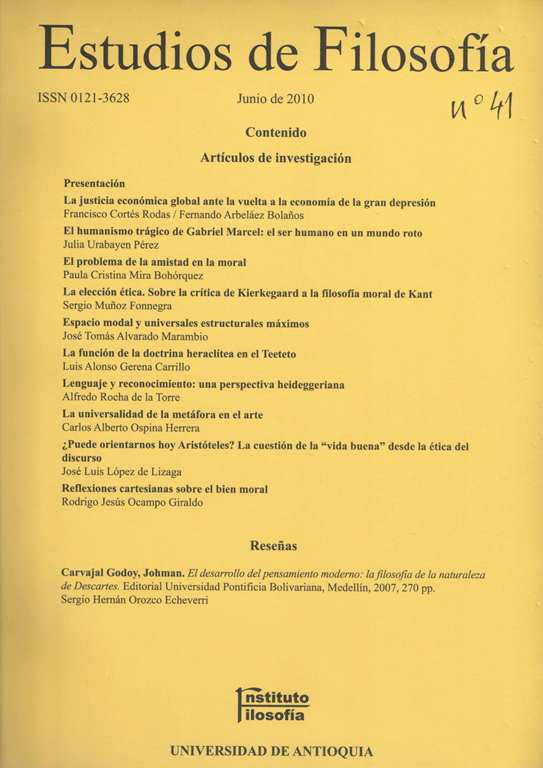La función de la doctrina heraclítea en el Teeteto
DOI:
https://doi.org/10.17533/udea.ef.11607Palabras clave:
Doctrina Heraclítea, Protágoras, Relativismo, PlatónResumen
Descargas
Citas
ARISTÓTELES (1982) Metafísica, ed., trad. y notas V. García Yebra. Madrid, Gredos.
ARISTÓTELES (1987) Tratados Breves de Historia Natural. Acerca de la Generación y la Corrupción, trad., intr. y nts. E. La Croce, Madrid, Gredos.
BOERI, M. (2006) Platón. Teeteto. Introducción, traducción y notas de Marcelo Boeri. Buenos Aires, Losada.
BOERI, M. (2007) Apariencia y Realidad en el Pensamiento Griego, Buenos Aires, Colihue.
BURNYEAT, M. F. (1990) The Theaetetus of Plato. Indianapolis, Hackett Publishing Company.
BURNYEAT, M. F. (1982) Idealism and Greek Philosophy: What Descartes Saw and Berkeley Missed, Philosophical Review, 91, 3-43. DOI: https://doi.org/10.2307/2184667
CORNFORD, F. M. (1935) Plato’s Theory of Knowledge. The Theaetetus and the Sophist of Plato. Translated with a commentary. London, Routledge.
CHAPPELL, T. (2005), Reading Plato’s Theaetetus, Indianapolis/ Cambridge, Hackett Publishing Company.
CHERNISS, H. F. (1957) The Relation of the Timaeus to Plato’s Later Dialogues, American Journal of Philology, 78, 225-66. DOI: https://doi.org/10.2307/292120
DUKE, E. A. et al. (1995) Platonis Opera. Oxford, Oxford Classical Texts.
GERENA, L. et al. (2000) Introducción a la teoría estoica de las pasiones (fragmentos estoicos sobre las pasiones, selección y traducción), Revista Semestral Signos Filosóficos, Departamento de Filosofía, CSH / UAM / Iztapalapa, vol. II, núm. 3, enero-junio, 2000, pp. 181-201.
GERENA, L. et al. (2009) La descripción platónica de la percepción, Revista Ideas y Valores, 139, volumen LVIII, abril.
IRWIN, T. H. (1977) Plato’s Heracliteanism, Philosophical Quarterly, 27, 1-13. DOI: https://doi.org/10.2307/2218924
LIDDELL, H. G. and SCOTT, R. (1983) Greek-English Lexikon. Oxford, Oxford at the Clarendon Press.
LONG, A. A. y SEDLEY, D. N. (1997) The Hellenistic Philosophers. Cambridge, Cambridge University Press, 2 vols.
McDOWELL, JOHN (1973) Plato: Theaetetus. Translated with notes. Oxford, Clarendon Press.
SAYRE, K. M. (1969) Plato’s Analytic Method. University of Chicago Press, Chicago and London.
TODD, ROBERT B. (1976) Alexander of Aphrodisias on Stoic Physics. A study of the De Mixtione, with preliminary essays, text, translations and commentary, en: Philosophia Antiqua, a series of monographs on ancient philosophy, W. J. Verdenius y J. H. Waszink (eds.), vol. XXVIII. Leiden.
PLATÓN (1988) Teeteto. Traducción, introducción y notas A. Vallejo Campos. Madrid, Gredos, v. 5.
Descargas
Publicado
Cómo citar
Número
Sección
Categorías
Licencia
Derechos de autor 2010 Luis Alonso Gerena Carrillo

Esta obra está bajo una licencia internacional Creative Commons Atribución-NoComercial-CompartirIgual 4.0.
Los autores que publican en Estudios de Filosofía acuerdan los siguientes términos:
1. El Autor retiene el copyright del "Artículo", por el cual se entiende todos los objetos digitales que pueden resultar de la subsiguiente publicación o distribución electrónica.
2. En conformidad con los términos de este acuerdo, el autor garantizará a Estudios de Filosofía como Editor el derecho de la primera publicación del artículo.
3. El Autor le concederá al Editor un derecho perpetuo y no-exclusivo, así como una licencia de la misma clase, de publicar, archivar y hacer accesible el Artículo parcial o totalmente en todos los medios conocidos o por conocerse, derecho y licencia que se conocen como Creative Commons License Deed. Atribución-No Comercial- Compartir igual CC BY-NC-SA o su equivalente que para efectos de eliminar toda duda, le permite a otros copiar, distribuir, y transmitir el Artículo bajo las siguientes condiciones: (a) Atribución: Se deben reconocer los créditos de la obra de la manera especificada por el Autor a Estudios de Filosofía, pero no de una manera que sugiera que tiene su apoyo o que apoyan el uso que hace de su obra. (b) No Comercial: No se puede utilizar el Artículo para fines comerciales.
4. El Autor puede realizar otros acuerdos contractuales no comerciales para la distribución no exclusiva de la versión publicada del Artículo (v. gr. ponerlo en un repositorio institucional o publicarlo en un libro) con la condición de que haga el debido reconocimiento de su publicación original en Estudios de Filosofía.
5. A los Autores se les permite y Estudios de Filosofía promueve publicar en línea (online) la versión pre-impresa del Artículo en repositorios institucionales o en sus páginas web, antes y durante la publicación, por cuanto que puede producir intercambios académicos productivos, así como una mayor citación del Artículo publicado (ver The Effect of Open Access). Dicha publicación durante el proceso de producción y en la publicación del Artículo se espera que se actualice al momento de salir la versión final, incluyendo una referencia a la URL de Estudios de Filosofía.















